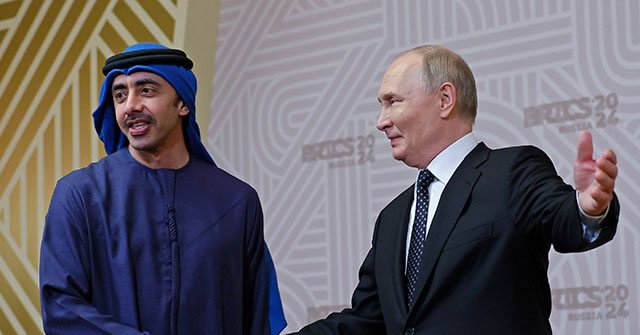The annual summit for members of the BRICS anti-American bloc began on Tuesday, focused on its core members engaging in bilateral meetings prior to the largest summit including all nine members and dozens of invited guests from countries interested in joining.
BRICS is an organization named after core members Brazil, Russia, India, China, and South Africa. China and Russia tend to be the most influential members of the coalition; this year’s summit is taking place in the city of Kazan, Russia. In addition to its original members, BRICS announced in January the entry of four new members to the bloc: Egypt, Ethiopia, the United Arab Emirates (UAE), and Iran. Two other countries were invited to join: Argentina, which declined immediately, and Saudi Arabia, which claimed to accept the invitation but never formalized its membership.
In addition to the members of the group, another 33 countries were invited to attend and have sent various levels of representatives. High atop the list of anticipated guests is Turkish strongman Recep Tayyip Erdogan, the first NATO country leader invited to attend a BRICS summit.
BRICS member countries have described addressing the dozens of countries seeking to join the coalition as a top priority for this year’s summit, as well as establishing an independent financial mechanism for international trade that divorces member countries from the use of the U.S. dollar. Several BRICS member states – most prominently, host Russia – face severe Western sanctions for their systematic human rights abuses that have complicated the use of the dollar in trade. Russia was banned from using the international SWIFT payment system in 2022 in response to its ongoing invasion of Ukraine, placing urgency on the BRICS plan to create a sanctions-proof alternative to SWIFT.
The Russian outlet Sputnik detailed on Monday that this year’s BRICS summit will feature two parts, one for members and one for members and invited guests. The first half of the summit, the outlet claimed, is called “Strengthening Multilateralism for Equitable Global Development and Security.” The second, with the expanded guest list, is called “BRICS and the Global South – Jointly Building a Better World.”
“Participants are expected to discuss the creation of a BRICS digital payment platform, BRICS Bridge, and ways to increase trade in national currencies,” Sputnik detailed.
Tuesday’s itinerary began with Putin greeting fellow heads of state upon their arrival. Putin held meetings with Indian Prime Minister Narendra Modi, communist Chinese dictator Xi Jinping, and South African President Cyril Ramaphosa, among others. Brazilian President Luiz Inácio Lula da Silva abruptly canceled his attendance to the summit after suffering a major head injury on Sunday.
“I would like to welcome you all to Russia, this time in Kazan,” Putin reportedly told Modi and his delegation upon arrival, thanking Modi for visiting Russia again after a stop in Moscow in July.
Modi reportedly told Putin that he was proud that BRICS had successfully “developed its own identity and many countries now wish to join.”
Sputnik claimed that Putin has 17 bilateral meetings planned throughout the summit.
The Chinese state Xinhua News Agency reported on Tuesday that Xi’s goal at the summit is to seek “greater BRICS cooperation,” and much of the focus will be economic. The discussion of an alternative international payment system is high on the agenda, as well as expanding the influence of the “New Development Bank,” the BRICS alternative to the World Bank and International Monetary Fund (IMF). The NBD, as BRICS nations refer to it, has yet to make a significant mark in global finance due to its small size and nascent state, but the head of the platform, disgraced former Brazilian President Dilma Rousseff, has touted the “use of local currency” as a way to facilitate NBD activity.
While most BRICS members focus on economics, Iranian President Masoud Pezeshkian and his team have repeatedly stated that his country’s top goal at the summit is to antagonize Israel, which is currently fighting a war against multiple Iranian-backed terrorist organizations.
“We are determined to use our participation in the summit to hold diplomatic talks and make efforts to draw the attention of the international community to the threats related to the continuing crimes of the Zionist regime,” Foreign Ministry spokesman Esmaeil Baghaei said this week, according to the Russian news agency Tass.
On Tuesday, Pezeshkian focused on America as the enemy.
“The heads of state who will attend this summit will present their vision of BRICS. This event can eclipse the US unipolar world. BRICS is a way out of US totalitarianism,” Pezeshkian said before departing for Kazan. “There will be a meeting of [the leaders of] BRICS member countries that seek to build a multipolar world.”
Pezeshkian, according to the Russian news agency Tass, added as an afterthought that he hoped “to reach good agreements in energy, industry, trade, and tourism.”
The anti-American sentiment is pervasive among BRICS members. On Saturday, Putin delivered remarks in which he claimed to have no negative sentiment towards the United States, but sought to divorce his country fromthe dollar.
“I think the United States needs to give it a thought that they have spoiled the relationship with Russia by imposing continuous sanctions, and it has a negative impact eventually on them,” Putin was quoted as saying. “So, the entire world is thinking whether dollar is worth using.”
Xinhua, in its coverage of the summit, quoted a “political commentator,” Carlos Martinez, who described the priority of the summit as tied to “mov[ing] away from the dominance of Western voices and allow countries from the Global South to have a meaningful say in international relations.”
